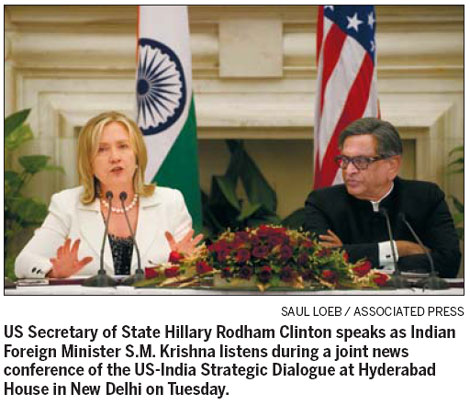Clinton encouraged by India-Pakistan peace talks

New Delhi - US Secretary of State Hillary Rodham Clinton said on Tuesday that the United States was "encouraged'" by the revived peace talks between nuclear-armed India and Pakistan.
Clinton spoke at a news conference after she talked with top Indian officials about Pakistan, the US withdrawal plans for Afghanistan and ways to broaden economic ties between the United States and India.
Her talks came less than a week after a terror attack in Mumbai killed 20 people, in the worst terror strike in India since 10 Pakistan-based gunmen rampaged through the country's financial capital in 2008, killing 166 people.
After that attack, talks broke off between India and Pakistan, but they have resumed in recent months and the two countries' foreign ministers are expected to meet next week.
"We are encouraged by the dialogue between India and Pakistan," Clinton said, calling talks "the most promising approach" to build more confidence between the countries.
Washington is eager for fragile peace talks between India and Pakistan to pick up steam, in part so Pakistan can focus on its chaotic Afghan border.
According to Clinton, counter-terrorism cooperation topped the 2nd US-India Strategic Dialogue.
"We pledge full support to India in (its) fight against terror, it is also our fight against terrorism and extremism," she said.
"We're allies in the fight against violent extremist networks," she added.
Clinton said that Washington sees Pakistan as a key ally in its war against terror, but Pakistan needs to fight terror on its own.
"We cannot tolerate safe haven to terrorists anywhere, it is in the interest of Pakistan itself to act against terrorism," she said.
Once frosty relations between India and the United States have warmed considerably in recent years as Washington has looked to India as a stable ally in turbulent South Asia and its growing economy as a valuable market for US goods.
During a two and half hour meeting on Tuesday, Clinton and S.M. Krishna, India's foreign minister, agreed to strengthen their countries' ties on energy, security, the economy, education, science and promoting stability across the region.
Analysts say the United States' primary interest is to maintain influence in every corner of the world, and the fast-growing economy in the Asia-Pacific region has made the country enhance its involvement in the area.
Rong Ying, fellow with China Institute of International Studies, said the intention of the development of the US-India relationship is to balance China's growing influence in the region. However, India does not want to be Washington's tool to contain China.
China and India share the same strategic interests on many issues, and the containment of China does not conform to India's long-term interests.
Rong said a Sino-US-Indian strategic triangle is very complicated, and the three countries have different interactions on different topics.
He noted that Sino-US bilateral ties, however, go beyond bilateral scope and have influence on both Sino-Indian and US-Indian ties.
AP-Xinhua-China Daily
(China Daily 07/20/2011 page12)








